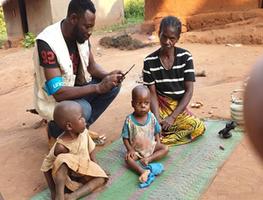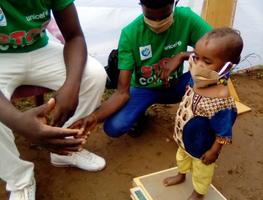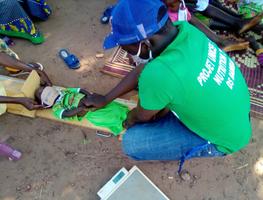Request support on coordination, information management, integration for nutrition outcomes or technical nutrition in emergencies assistance.
التماس الدعم لتنسيق التغذية وإدارة المعلومات والتغذية في حالات الطوارئ
Demander un appui pour la coordination de la nutrition, la gestion de l'information et la nutrition dans les situations d'urgence
Buscar apoyo para la coordinación de la nutrición, la gestión de la información y la nutrición en situaciones de emergencia
Solicite apoio para coordenação em nutrição, gestão de informação e nutrição em emergências
Central African Republic
L2Coordination mechanism: Cluster
Year of activation: 2007
NCC: UNICEF P3
Deputy: MEDECIN D'AFRIQUE (MDA)
IMO: UNICEF
Coordination arrangement: UNICEF Lead
Subnational level: 4 sub-national hubs in Bambari, Bouar, Kaga-Bandoro and Bossangoa
Annual report 2023
January to December 2023
By 2023, the Nutrition Cluster and its partners were committed to supporting the following elements:
• Strengthening partners' capacities through training on the cluster approach, evaluations, etc.
• Strengthening coordination of the response at strategic and operational levels by implementing the SOP on triggering coordination at local level in hotspot areas and proposing the opening of other sub-cluster taking into account the provision of humanitarian architecture.
• Improving the quality of data to regenerate evidence and guide analysis and decision-making by activating the working group on assessments and setting up a framework to guide assessments and rapid surveys.
• To strengthen advocacy for the mobilization of resources and the repositioning of nutrition.
• Facilitate analyses and take part in the process of drafting the 2024 humanitarian response plan for CAR by organizing the workshop on IPC analyses of acute malnutrition and by producing the quality HNO and HNP with the participation and contributions of all the actors in the nutrition cluster.
Generally speaking, all the objectives set for 2023 have been achieved with the contribution and participation of all the member actors of the nutrition cluster (WFP, UNICEF, WHO, FAO, national and international NGOs and observers) with technical support from GNC.
Similarly, the nutrition cluster has also worked hard on its localization strategy, not only by drafting its localization strategy but also by facilitating access to humanitarian funds for national NGOs and strengthening their technical support.
Also, taking into account the dynamics of the current crisis, the Nutrition Cluster has integrated 'resilience' as an approach to implementing the response in areas that have continued to enjoy a certain level of stability but are still exposed to the vulnerability factors of acute malnutrition for pregnant and breastfeeding women and children under 5.
Funding the Nutrition Cluster (coordination) and the humanitarian response plan remains a serious challenge for CAR. Despite repeated lobbying of agencies, the EHP and certain donors, the Nutrition Cluster is one of the least funded sectors of the HRP 2023, with an estimated 28% of funding.
| Advocacy Survey | |
| Country Advocacy Strategy developed | Yes |
| Link to document | |
| Advocacy activities included in annual work plan | Yes |
| Specific WG leading advocacy work established | No |
| Preparedness | |
| Contingency plan or ERP plan developed/updated | No |
| Link to document | |
| Intersectoral Collaboration (ISC) | |
| Intersectoral projects currently under implementation | Yes |
| Clusters engaged | |
| Health, WASH, FOOD SECURITY | |
Key Figures
(million)Funding
(million)- Children 6-59 months
- Pregnant and Lactating Women



